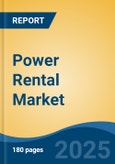501 to 2500 KW is the fastest growing segment, Asia-Pacific is the largest regional market
Speak directly to the analyst to clarify any post sales queries you may have.
10% Free customizationThis report comes with 10% free customization, enabling you to add data that meets your specific business needs.
Key Market Drivers
The increasing need for continuous and reliable power supply is a crucial driver of the global power rental market, as industries rely on uninterrupted energy to maintain productivity and prevent financial losses. Data centers, for example, require consistent power beyond what traditional grids can reliably provide. The International Energy Agency’s March 2024 Electricity 2024 report indicates that global electricity consumption from data centers is expected to more than double, rising from 460 TWh in 2022 to over 1,000 TWh by 2026.Simultaneously, grid instability caused by aging infrastructure, extreme weather, and integration challenges with renewable energy sources drives demand for temporary power solutions. According to NERC’s June 2024 State of Reliability report, wind resources experienced forced outage rates of 18.9% in 2023, up from 18.1% in 2022, contributing to grid unreliability. Strong industry performance reflects this demand: Aggreko reported annual sales of USD 2.85 billion for the year ending December 28, 2024, a 14% increase over 2023, as noted by International Rental News in April 2025.
Key Market Challenges
A major challenge to the global power rental market lies in the substantial capital expenditure required to procure, maintain, and upgrade fleets of power generation and distribution assets. These investments significantly strain profitability and can restrict the competitive capabilities of smaller firms. The high capital intensity creates barriers to entry and inherently favors large, established players with stronger financial capacity. According to the European Rental Association, equipment investment across the European rental market was expected to remain flat in 2023 following a 4.2% increase in 2022, illustrating the constraining financial environment. These conditions limit innovation and expansion opportunities, ultimately slowing broader market growth.Key Market Trends
Growing Adoption of Hybrid and Renewable Energy Solutions is a pivotal trend shaping the global power rental market. Companies increasingly deploy hybrid systems that combine conventional generators with battery storage or solar power, driven by stricter environmental regulations and rising corporate sustainability goals. Aggreko invested over USD 140 million across 2023 and 2024 to expand its Greener Upgrades™ fleet, including battery systems designed to reduce emissions and optimize fuel consumption. This shift is reinforced by declining renewable energy costs; according to IRENA’s 2025 Renewable Power Generation Costs in 2024 report, total installed costs for most renewable power technologies fell by more than 10% from 2023 to 2024.Key Market Players Profiled:
- Caterpillar Inc.
- Herc Rentals Inc.
- Aggreko Ltd
- United Rentals Inc.
- Cummins, Inc.
- Ashtead Group plc
- Wacker Neuson SE
- Generac Power Systems, Inc.
Report Scope:
In this report, the Global Power Rental Market has been segmented into the following categories:By Fuel Type:
- Diesel
- Natural Gas
- Others
By Power Rating:
- Up to 50 KW
- 51 to 500 KW
- 501 to 2500 KW
- Above 2500 KW
By Application:
- Peak shaving
- Standby power
- Continuous power
By End-Use Industry:
- Utilities
- Oil & Gas
- Mining
- Manufacturing
- Telecom & Data Centers
- Others
By Region:
- North America
- Europe
- Asia-Pacific
- South America
- Middle East & Africa
Competitive Landscape
Company Profiles: Detailed analysis of the major companies present in the Global Power Rental Market.Available Customizations:
With the given market data, the publisher offers customizations according to a company's specific needs. The following customization options are available for the report.Company Information
- Detailed analysis and profiling of additional market players (up to five).
This product will be delivered within 1-3 business days.
Table of Contents
Companies Mentioned
The companies profiled in this Power Rental market report include:- Caterpillar Inc.
- Herc Rentals Inc.
- Aggreko Ltd
- United Rentals Inc.
- Cummins, Inc.
- Ashtead Group plc
- Wacker Neuson SE
- Generac Power Systems, Inc.
Table Information
| Report Attribute | Details |
|---|---|
| No. of Pages | 180 |
| Published | November 2025 |
| Forecast Period | 2024 - 2030 |
| Estimated Market Value ( USD | $ 22.83 Billion |
| Forecasted Market Value ( USD | $ 37.02 Billion |
| Compound Annual Growth Rate | 8.3% |
| Regions Covered | Global |
| No. of Companies Mentioned | 9 |









